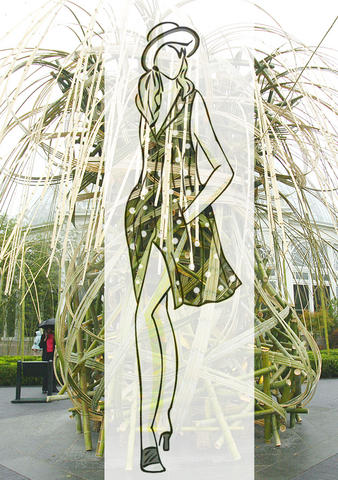It drapes like silk, it breathes better than cotton and it's softer than your favorite flannel jammies. With credentials like that, it hardly seems necessary to mention that the fabric is eco-friendly.
Bamboo, which requires neither fertilizers nor pesticides to grow at the amazing rate of a foot a day, has for some time been the darling of the green crowd, who touts its hardness as a quality that makes it suitable for products like flooring and furniture.
But bamboo has its softer side, too.

PHOTO: AFP
Bamboo fibers can be spun into a fabric that feels soft, is easy to care for, keeps you cool in warm weather and warm in cool weather, and even is said to have naturally antibacterial properties that make it odor-resistant.
Companies like Bamboosa, Spun Bamboo, United Bamboo and Jonano have jumped on the bamboo bandwagon, offering items such as T-shirts, socks and hooded jerseys.
Designers like Carilyn Vaile and Amanda Shi have taken bamboo a step further, conjuring up entire wardrobes of out flowing bamboo and bamboo-blend fabrics.
Vaile's versatile Green Label collection - she sells a skirt that can be worn as a dress and dresses that can be worn multiple ways - is composed of a 92 percent-bamboo-fiber fabric she calls BambooTee. The fabric has a touch of spandex "for memory and comfort."
Bamboo was a natural fit with the way Vaile was already designing. "What we're known for is being comfortable and chic," she says. Once I heard about all the properties of bamboo - it can be washed and dried, and doesn't require special care - it fit really well with the versatile and multifunctional pieces that we make."
Rich Delano, who lives in China and owns a factory there that produces bamboo clothing sold under a number of private labels, started his trek into the world of bamboo fashions in 2004. When I started my company, no one was doing it," he says.
The feel of the fabric is the number one advantage of bamboo, Delano says. "We always have our favorite T-shirt that's worn down and feels super soft, and bamboo is like that from the start."
Most bamboo-clothing vendors are virtual stores, but Daniel Jacobs is the owner of Shirts of Bamboo, a ricks-and-mortar store in St Petersburg, Florida, that sells only bamboo clothing.
"People love the product," he says. "The look on their face when they touch it for the first time is just so wonderful to see."
If all this bamboo ballyhoo sounds too good to be true, there are some environmentalists who are not totally enamored of bamboo fabric. Although bamboo is, indeed, considered a sustainable product and an excellent choice for materials like flooring, the process used to break bamboo down into the fibers that are made into cloth uses caustic chemicals, writes a blogger on treehugger.com, a popular environmentalist site. But then the same blogger goes on to cite the many positive qualities of bamboo fabric, including that it is 100 percent biodegradable.
Where to buy bamboo clothing
Bamboo clothing can be hard to come by. Products mentioned in the story can be purchased at the following Web sites.
Visit www.carilynvaile.com for details on Carilyn Vaile fashions
Amand Shi's sophisticated Avita line is available at www.avitastyle.com
Jonano sells clothing from a bamboo fabric it calls ecoKashmere.
Shop at www.jonano.com
Spun Bamboo sells Rich Delano's products. Shop at www.bambooclothes.com
Shirts of Bamboo's Web site is www.shirtsofbamboo.com

June 9 to June 15 A photo of two men riding trendy high-wheel Penny-Farthing bicycles past a Qing Dynasty gate aptly captures the essence of Taipei in 1897 — a newly colonized city on the cusp of great change. The Japanese began making significant modifications to the cityscape in 1899, tearing down Qing-era structures, widening boulevards and installing Western-style infrastructure and buildings. The photographer, Minosuke Imamura, only spent a year in Taiwan as a cartographer for the governor-general’s office, but he left behind a treasure trove of 130 images showing life at the onset of Japanese rule, spanning July 1897 to

In an interview posted online by United Daily News (UDN) on May 26, current Chinese Nationalist Party (KMT) Chairman Eric Chu (朱立倫) was asked about Taichung Mayor Lu Shiow-yen (盧秀燕) replacing him as party chair. Though not yet officially running, by the customs of Taiwan politics, Lu has been signalling she is both running for party chair and to be the party’s 2028 presidential candidate. She told an international media outlet that she was considering a run. She also gave a speech in Keelung on national priorities and foreign affairs. For details, see the May 23 edition of this column,

The Taiwan People’s Party (TPP) on May 18 held a rally in Taichung to mark the anniversary of President William Lai’s (賴清德) inauguration on May 20. The title of the rally could be loosely translated to “May 18 recall fraudulent goods” (518退貨ㄌㄨㄚˋ!). Unlike in English, where the terms are the same, “recall” (退貨) in this context refers to product recalls due to damaged, defective or fraudulent merchandise, not the political recalls (罷免) currently dominating the headlines. I attended the rally to determine if the impression was correct that the TPP under party Chairman Huang Kuo-Chang (黃國昌) had little of a

At Computex 2025, Nvidia CEO Jensen Huang (黃仁勳) urged the government to subsidize AI. “All schools in Taiwan must integrate AI into their curricula,” he declared. A few months earlier, he said, “If I were a student today, I’d immediately start using tools like ChatGPT, Gemini Pro and Grok to learn, write and accelerate my thinking.” Huang sees the AI-bullet train leaving the station. And as one of its drivers, he’s worried about youth not getting on board — bad for their careers, and bad for his workforce. As a semiconductor supply-chain powerhouse and AI hub wannabe, Taiwan is seeing